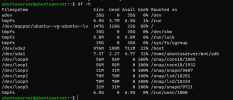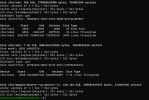Merge two ubuntu partitions
- Thread starter PeterMarcusH.
- Start date
You are using an out of date browser. It may not display this or other websites correctly.
You should upgrade or use an alternative browser.
You should upgrade or use an alternative browser.
How would i got about doing that?hi,
you don't need to merge them.
why don't you mount/dev/vda3and just use the disk space?
you can try to just mount it like this:
and then check the output of
you can also add it to your
Code:
mkdir /mnt/newdisk
mount /dev/vda3 /mnt/newdiskand then check the output of
df -h to see if it's listed there.you can also add it to your
/etc/fstab for persistence if the mounting worked.Hmm im getting the following error
Code:
ubuntuserver@ubuntuserver:~$ sudo mount /dev/vda3 /mnt/newdisk/
mount: /mnt/newdisk: unknown filesystem type 'LVM2_member'.oh weird, i thought /dev/vda3 would be a linux partition.
i guess your goal is to get more space out of this. can you post the output of following commands (copy/paste here into
i guess your goal is to get more space out of this. can you post the output of following commands (copy/paste here into
[code] tags)
Code:
df -h
lsblk -f
fdisk -l
pvs -a
lvs -a
vgs -a
lvdisplay
Code:
ubuntuserver@ubuntuserver:~$ df -h
Filesystem Size Used Avail Use% Mounted on
udev 35G 0 35G 0% /dev
tmpfs 6.9G 4.4M 6.9G 1% /run
/dev/mapper/ubuntu--vg-ubuntu--lv 147G 36G 104G 26% /
tmpfs 35G 0 35G 0% /dev/shm
tmpfs 5.0M 0 5.0M 0% /run/lock
tmpfs 35G 0 35G 0% /sys/fs/cgroup
/dev/vda2 976M 198M 712M 22% /boot
/dev/sda1 7.3T 2.2T 4.8T 32% /home/ubuntuserver/mnt/sdb
/dev/loop0 56M 56M 0 100% /snap/core18/1885
/dev/loop1 56M 56M 0 100% /snap/core18/1932
/dev/loop3 70M 70M 0 100% /snap/lxd/18251
/dev/loop2 31M 31M 0 100% /snap/snapd/9607
/dev/loop4 70M 70M 0 100% /snap/lxd/18324
/dev/loop5 31M 31M 0 100% /snap/snapd/9721
tmpfs
Code:
ubuntuserver@ubuntuserver:~$ lsblk -f
NAME FSTYPE LABEL UUID FSAVAIL FSUSE% MOUNTPOINT
loop0 squashfs 0 100% /snap/core18/1885
loop1 squashfs 0 100% /snap/core18/1932
loop2 squashfs 0 100% /snap/snapd/9607
loop3 squashfs 0 100% /snap/lxd/18251
loop4 squashfs 0 100% /snap/lxd/18324
loop5 squashfs 0 100% /snap/snapd/9721
sda
└─sda1 ext4 9f263420-23c8-4a62-95a6-e8235664b8dc 4.7T 30% /home/ubuntuserver/mnt/sdb
vda
├─vda1
├─vda2 ext4 91fef7ad-1082-4e80-a1f1-9eb2aed37931 711.3M 20% /boot
└─vda3 LVM2_member xMeVnL-LZw7-HcZO-yMp8-oKaY-msPh-okdoz6
└─ubuntu--vg-ubuntu--lv
ext4 264e7379-2ac5-43c2-93f0-7bb660d16c21 103.5G 25% /
Code:
ubuntuserver@ubuntuserver:~$ sudo fdisk -l
Disk /dev/loop0: 55.33 MiB, 58007552 bytes, 113296 sectors
Units: sectors of 1 * 512 = 512 bytes
Sector size (logical/physical): 512 bytes / 512 bytes
I/O size (minimum/optimal): 512 bytes / 512 bytes
Disk /dev/loop1: 55.37 MiB, 58052608 bytes, 113384 sectors
Units: sectors of 1 * 512 = 512 bytes
Sector size (logical/physical): 512 bytes / 512 bytes
I/O size (minimum/optimal): 512 bytes / 512 bytes
Disk /dev/loop2: 30.95 MiB, 32432128 bytes, 63344 sectors
Units: sectors of 1 * 512 = 512 bytes
Sector size (logical/physical): 512 bytes / 512 bytes
I/O size (minimum/optimal): 512 bytes / 512 bytes
Disk /dev/loop3: 69.37 MiB, 72732672 bytes, 142056 sectors
Units: sectors of 1 * 512 = 512 bytes
Sector size (logical/physical): 512 bytes / 512 bytes
I/O size (minimum/optimal): 512 bytes / 512 bytes
Disk /dev/loop4: 69.37 MiB, 72728576 bytes, 142048 sectors
Units: sectors of 1 * 512 = 512 bytes
Sector size (logical/physical): 512 bytes / 512 bytes
I/O size (minimum/optimal): 512 bytes / 512 bytes
Disk /dev/loop5: 30.96 MiB, 32440320 bytes, 63360 sectors
Units: sectors of 1 * 512 = 512 bytes
Sector size (logical/physical): 512 bytes / 512 bytes
I/O size (minimum/optimal): 512 bytes / 512 bytes
Disk /dev/vda: 350 GiB, 375809638400 bytes, 734003200 sectors
Units: sectors of 1 * 512 = 512 bytes
Sector size (logical/physical): 512 bytes / 512 bytes
I/O size (minimum/optimal): 512 bytes / 512 bytes
Disklabel type: gpt
Disk identifier: 2B604EF1-D5A1-42F0-8BD8-5A2FDA4B7B67
Device Start End Sectors Size Type
/dev/vda1 2048 4095 2048 1M BIOS boot
/dev/vda2 4096 2101247 2097152 1G Linux filesystem
/dev/vda3 2101248 734003166 731901919 349G Linux filesystem
Disk /dev/mapper/ubuntu--vg-ubuntu--lv: 148.102 GiB, 159983337472 bytes, 312467456 sectors
Units: sectors of 1 * 512 = 512 bytes
Sector size (logical/physical): 512 bytes / 512 bytes
I/O size (minimum/optimal): 512 bytes / 512 bytes
Disk /dev/sda: 7.28 TiB, 8001563222016 bytes, 15628053168 sectors
Disk model: QEMU HARDDISK
Units: sectors of 1 * 512 = 512 bytes
Sector size (logical/physical): 512 bytes / 512 bytes
I/O size (minimum/optimal): 512 bytes / 512 bytes
Disklabel type: gpt
Disk identifier: EF701E96-0851-6F43-AECC-C9955481E2FA
Device Start End Sectors Size Type
/dev/sda1 2048 15628053134 15628051087 7.3T Linux filesystem
Code:
ubuntuserver@ubuntuserver:~$ sudo pvs -a
PV VG Fmt Attr PSize PFree
/dev/loop0 --- 0 0
/dev/loop1 --- 0 0
/dev/loop2 --- 0 0
/dev/loop3 --- 0 0
/dev/loop4 --- 0 0
/dev/loop5 --- 0 0
/dev/sda1 --- 0 0
/dev/vda2 --- 0 0
/dev/vda3 ubuntu-vg lvm2 a-- <149.00g 0
Code:
ubuntuserver@ubuntuserver:~$ sudo lvs -a
LV VG Attr LSize Pool Origin Data% Meta% Move Log Cpy%Sync Convert
ubuntu-lv ubuntu-vg -wi-ao---- <149.00g
Code:
ubuntuserver@ubuntuserver:~$ sudo vgs -a
VG #PV #LV #SN Attr VSize VFree
ubuntu-vg 1 1 0 wz--n- <149.00g 0
Code:
ubuntuserver@ubuntuserver:~$ sudo lvdisplay
--- Logical volume ---
LV Path /dev/ubuntu-vg/ubuntu-lv
LV Name ubuntu-lv
VG Name ubuntu-vg
LV UUID FFUQwi-57Se-n28F-UYmR-t5nE-C3mE-MJ8Ywg
LV Write Access read/write
LV Creation host, time ubuntu-server, 2020-09-20 00:23:20 +0000
LV Status available
# open 1
LV Size <149.00 GiB
Current LE 38143
Segments 1
Allocation inherit
Read ahead sectors auto
- currently set to 256
Block device 253:0so /dev/vda3 is actually your
you seem to be doing fine in space for now (you also have your extra disk) so maybe don't worry about it yet.
but if you see it running out then you can try adding another disk to the VM for example, and adding extra LV in it
ubuntu--vg-ubuntu--lv (as can be seen on lsblk output you posted)you seem to be doing fine in space for now (you also have your extra disk) so maybe don't worry about it yet.
but if you see it running out then you can try adding another disk to the VM for example, and adding extra LV in it



